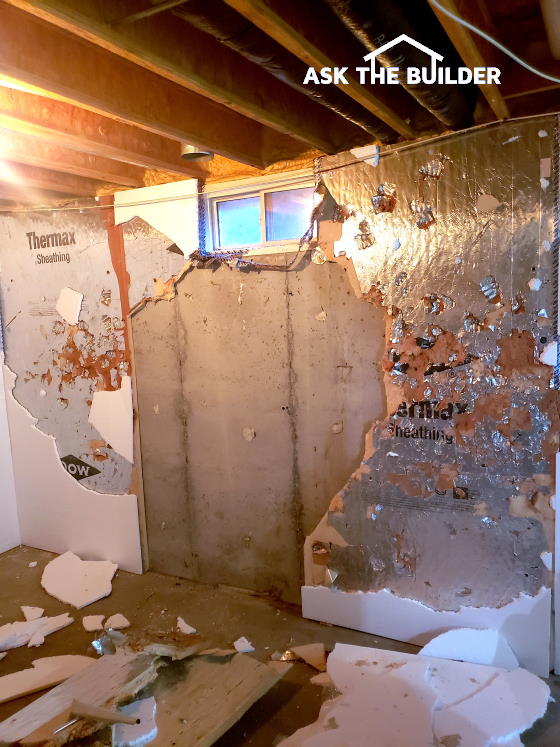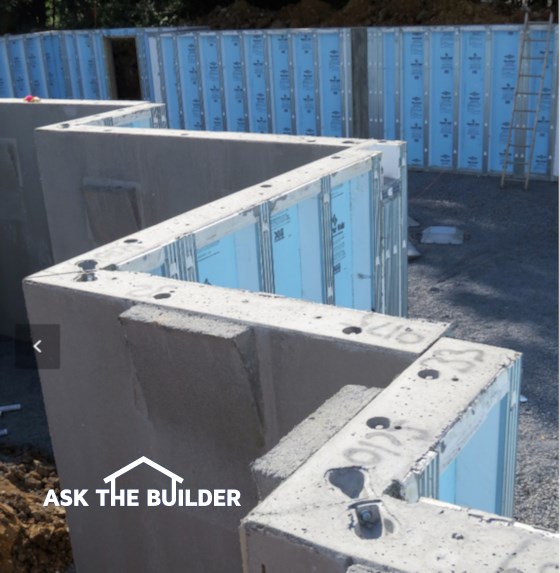Basement Foam Board Installation

Basement Foam Board Installation | The young homeowner thought it would be a good idea to tear all this wonderful foam insulation off the wall. Copyright 2021 Tim Carter
Basement Foam Board Installation - Inside or Outside
QUESTION: I’m 23-years old and just got out of college. I bought my first small house and am about to remodel my basement. The previous owners of the house glued 2-inch-thick foam insulation to the poured concrete walls. It’s got an aluminum foil face on it. Then they covered that with an open-cell foam board that’s 3/4-inch thick. It seems the smart thing to do is tear all this off and I started to do just that but thought to ask you before I go any further. The foam board seems to be in the way of installing the electric wires that I know are supposed to be behind the insulation. What’s the best way to deal with this situation and is the foam board even any good? Matthew W., Grand Rapids, MI
You’ve got to applaud Matthew for having the smarts to do some research before making a mistake. He was about to make a costly one. His question is also a great example of not having enough life experience to be able to apply critical-thinking skills to a dilemma. I have an old saying, “You don’t know what you don’t know.”
How Old Were You, Tim, When You Bought Your First Home?
I loved Matthew’s question because it flooded me with memories of my own first home. I was also 23-years-old when I purchased a quaint three-bedroom Craftsman home in the popular Hyde Park neighborhood of Cincinnati, OH. It was an FHA repossessed home I won at an auction for just $8,500.00. It turns out I was the only bidder and I guess the gaping hole in the roof of the master bedroom was a turn off to other bidders.
Is it Hard to Get a Bank Loan for Flipping Houses?
No bank would finance the opportunity and fortunately, my father-in-law’s hobby was real estate investing so he became the lender. I needed an additional $8,000 to fix up the house. My new wife and I moved in for just nine months and we sold it for $35,000.00. That was a tremendous return on investment, and it’s possible Matthew is on the same path to leap-frogging homes. It’s best to do this when you’re young!
How Much Did You Know About Building at Age 23?
What’s amazing looking back is how much I didn’t know at the time. This project became an incubator for me and I made a few mistakes that I never made again. None were critical to the overall long-term health of the house.
CLICK or TAP HERE to get FREE BIDS from local foam insulation contractors.
Should I Tear-Off Foam Insulation From the Wall?
Let’s now jump into Matthew’s conundrum. Holy tomato, for Pete’s sake don’t tear any of that insulation off the walls! The previous owners were wise and made a fantastic investment by putting all that foam on the frigid poured concrete walls. What’s more, the use of foil-faced foam is even smarter. It’s a radiant barrier and bounces heat back to its source. The only mistake I feel they made was adding the extra layer of open-cell foam over the foil-faced insulation. This will reduce the ability, to a degree, of the foil to bounce the heat of the basement back into the basement.
What Size Studs Should be Used to Frame Basement Walls?
If I were in Matthew’s basement right now, I’d start to frame the walls using either 2x3s or 2x4s. I’d create an air gap of about 3/4-inch between the back of the wall studs and the foam insulation.

Look at how the foam insulation is built into the actual poured concrete pre-cast walls! This is an excellent example of a precast concrete foundation wall system. This one is by Superior Walls. Note how the corners are mitered, the closed-cell insulation and interior wall studs. Copyright 2021 Tim Carter
What Does the Air Gap Do?
This air gap serves two purposes. First, it allows you to create plumb walls should the poured concrete be out of plumb. Second, the air space allows a place for any rogue condensation to evaporate.
Did You Use Foam on Your Basement Walls?
When I finished the basement of my last home in Cincinnati, I simply did what I said above, but there was no foam glued to my poured concrete foundation. I used regular fiberglass batts in the wall-stud cavities to insulate the room. Before adding drywall, I covered the walls with a 4-mil vapor barrier. The 3/4-inch air gap between the back of the studs and the concrete created the air break to help prevent mold and mildew growth should a tiny amount of moist room air make it behind the insulation.
Will Condensation Be an Issue?
Matthew should never have condensation problems because his foil-faced foam is a fantastic vapor barrier. As long as the seams between each sheet were sealed with aluminum tape and the gap at the floor caulked, no moist room air can get to the cold concrete.
How Do You Install Electric Cables and Wires in Studs?
He also doesn’t quite understand how to install electric cables and wires. I’d never want mine to be touching the poured concrete walls. He can simply drill holes in the center of the wood studs and pull the cables between boxes just as you would in any normal interior or exterior wall of a home. My advice to Matthew is to try to locate any videos made by the authors of the National Electrical Code and soak up all that delicious information.
Is Foam Board a Good Insulator?
Matthew wants to know if the foam board is good. Closed-cell foam is a fantastic product and I used it to insulate the floor of my outdoor shed. I installed this foam in such a way that it’s flush with the top of the floor joists.
Should the Foam Touch the Warm Side of the Wall Surface?
You want the insulation to be in direct contact with the surface that is on the warm side of the room. This is why you put fiberglass batts in direct contact with radiant-heating pipes and heat transfer plates that are attached to the underside of a floor. Never ever create an air space between the radiant tubing and the insulation.
If you’re young like Matthew with much more to discover about home improvement, or you’re any age, it would behoove you to become part of my free newsletter family where each week I share lots of wonderful tidbits about how you can have the best home on your street!
Column 1389